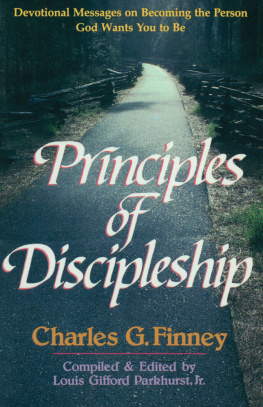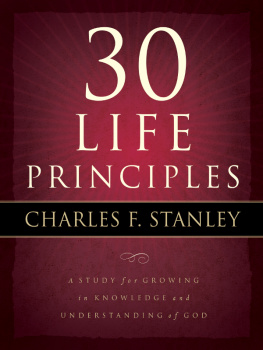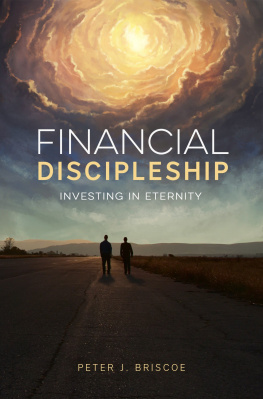Charles G. Finney - Principles of Discipleship
Here you can read online Charles G. Finney - Principles of Discipleship full text of the book (entire story) in english for free. Download pdf and epub, get meaning, cover and reviews about this ebook. year: 1988, publisher: Baker Publishing Group, genre: Religion. Description of the work, (preface) as well as reviews are available. Best literature library LitArk.com created for fans of good reading and offers a wide selection of genres:
Romance novel
Science fiction
Adventure
Detective
Science
History
Home and family
Prose
Art
Politics
Computer
Non-fiction
Religion
Business
Children
Humor
Choose a favorite category and find really read worthwhile books. Enjoy immersion in the world of imagination, feel the emotions of the characters or learn something new for yourself, make an fascinating discovery.
- Book:Principles of Discipleship
- Author:
- Publisher:Baker Publishing Group
- Genre:
- Year:1988
- Rating:3 / 5
- Favourites:Add to favourites
- Your mark:
- 60
- 1
- 2
- 3
- 4
- 5
Principles of Discipleship: summary, description and annotation
We offer to read an annotation, description, summary or preface (depends on what the author of the book "Principles of Discipleship" wrote himself). If you haven't found the necessary information about the book — write in the comments, we will try to find it.
Principles of Discipleship — read online for free the complete book (whole text) full work
Below is the text of the book, divided by pages. System saving the place of the last page read, allows you to conveniently read the book "Principles of Discipleship" online for free, without having to search again every time where you left off. Put a bookmark, and you can go to the page where you finished reading at any time.
Font size:
Interval:
Bookmark:

The Principles of Discipleship
Charles G. Finney
Compiled and Edited by Louis Gifford Parkhurst, Jr.

1988 by Louis Gifford Parkhurst, Jr.
Published by Bethany House Publishers
11400 Hampshire Avenue South
Bloomington, Minnesota 55438
www.bethanyhouse.com
Bethany House Publishers is a division of
Baker Publishing Group, Grand Rapids, Michigan.
www.bakerpublishinggroup.com
Ebook edition created 2012
All rights reserved. No part of this publication may be reproduced, stored in a retrieval system, or transmitted in any form or by any meansfor example, electronic, photocopying, recordingwithout the prior written permission of the publisher. The only exception is brief quotations in printed reviews.
ISBN 978-1-4412-6199-1
Library of Congress Cataloging-in-Publication Data is on file at the Library of Congress, Washington, DC.
The internet addresses, email addresses, and phone numbers in this book are accurate at the time of publication. They are provided as a resource. Baker Publishing Group does not endorse them or vouch for their content or permanence.
In this day of necessary contending for the truth of the Christian faith, in both word and deed, the great evangelist Charles G. Finney becomes an example of learned humility, compassion and gentleness. His sympathetic heart shines through the words of the letters in this book, while at the same time his courage and mental acumen is manifest as he argues for the Christian truths he had discovered from Gods Word. Finneys personality, as a loving champion of Christlike living, nowhere shines with more evidence than in these warm and personal letters sent to those who had heard him preach his famous revival sermons throughout America.
In many ways this book is a bridge to some of Finneys other writings, and a companion volume to several in the Finney Principles Series. First, these letters from The Oberlin Evangelist complete the collection of Finneys letters from that source. Donald W. Dayton compiled and edited Finneys Letters on Revival from The Oberlin Evangelist in his book Reflections on Revival , also published by Bethany House Publishers. With Principles of Discipleship and Reflections on Revival , the student of Finneys works has available for the first time in book form Finneys letters to the readers of The Oberlin Evangelist . Finney intentionally wrote these letters as though he were addressing the individual personally , and asked that people read them on their knees in prayer and apply his ideas to their own particular situation and needs. He used some of his letters to answer questions people sent to him after they heard him preach or read his books and lectures.
Second, Principles of Holiness (Finneys sermons on Christian holiness mostly from 1843), Principles of Sanctification (Finneys lectures on Christian holiness from 1840), Principles of Union with Christ (Finneys meditations on Christian holiness from 1847) and Principles of Discipleship (Finneys letters on Christian holiness from The Oberlin Evangelist mostly during 1841) are all companion volumes which examine this topic from different perspectives. All four volumes challenge us to live wholly consecrated to Jesus Christ in a faithful and loving relationship with God and our fellowman, but each one explores the meaning of sanctification a little differently. Sanctification discussed more thoroughly with reference to the baptism of the Holy Spirit can be found in The Believers Secret of Spiritual Power by Andrew Murray and Charles Finney, also published by Bethany House Publishers.
Principles of Discipleship is both practical , with advice to parents and pastors, and theoretical , dealing with the critics of the doctrine of sanctification and making helpful applications and clarifications using categorical syllogisms. From this collection of letters, we see how unfair many of Finneys critics were in their refusal to really try to understand what he was saying before they criticized him, and we also see with what patience and forbearance Finney replied to them, when necessary. He is an example to all of us! Finney never wrote to vindicate himself, but replied to the criticisms of the doctrine of sanctification because of the importance of its truth and because people needed a clearer understanding regarding Christian Holiness. (I would especially suggest that Finneys letter in , be read prior to the censure of Finneys views by the Troy Presbytery reprinted in that chapter. The Troy Presbytery so misrepresented his views that to analyze their comments before reading Finneys reply will lead to needless confusion.)
A few of Finneys ideas on diet will seem novel to us, and out of date, with regard to sanctification. However, when we remember that diet books and exercise books still make the bestseller lists in the secular book market today, Finneys comments do not seem totally out of place. Finney argued for simple frontier living, and he worked with students in a frontier college they had literally carved out of the forest wilderness; therefore, what he had to say was certainly appropriate. He tried to be current in his understanding of whatever concerned the human condition, and when we recognize that his references to the ideas of Sylvester Graham on diet are from a two-volume work published in 1839, and his letters were written in 1840, we see just how current he was in a day when books were not easily obtained.
Some of Finneys ideas regarding home schooling in comparison with public schooling are accepted by many families today, and his very protective ideas regarding the raising of children should cause people to reflect, especially when confronted with the rampant child abuse of today. All in all, through these letters we see a side of Finney not seen through his sermons and not captured in his Autobiography . No matter how active Finney was as a revivalist, theological teacher, pastor, and writer, he took seriously his duties as a father, and gave good suggestions regarding the importance of keeping our priorities in place.
Bethany House Publishers should be commended for their efforts to make Finneys works more widely accessible to the modern reader. A fine blend of Finneys works; collections of sermons, lectures, daily meditations, and letters, combine to introduce, educate, and inform new and old Christians alike. Finney tried to keep a very careful biblical balance, neither antinomian nor legalist, neither Arminian nor hyper-Calvinist: he understood the dangers of extremes. Finney cannot be easily pigeon-holed in a day when we prefer to label people and their ideas; therefore, with the many books by Finney now available, people can acquire their own understanding of truth and use Finney as a catalyst to help them think through biblical concepts and their contemporary application. Because some people who read Finney are legalistic, we cannot assume that Finney was legalistic, and because some people who read Finney are perfectionistic, we cannot assume that Finney was perfectionistic. Legalists, perfectionists, and critics of Finney, would all profit from an unbiased reading of these new books and new editions published by Bethany House Publishers.
I would like to personally thank Kathy Lytle for her typing of much of this manuscript, and for her fine editorial assistance in the midst of many pressing concerns.
For the sake of His Kingdom:
L. G. Parkhurst, Jr.
Font size:
Interval:
Bookmark:
Similar books «Principles of Discipleship»
Look at similar books to Principles of Discipleship. We have selected literature similar in name and meaning in the hope of providing readers with more options to find new, interesting, not yet read works.
Discussion, reviews of the book Principles of Discipleship and just readers' own opinions. Leave your comments, write what you think about the work, its meaning or the main characters. Specify what exactly you liked and what you didn't like, and why you think so.











